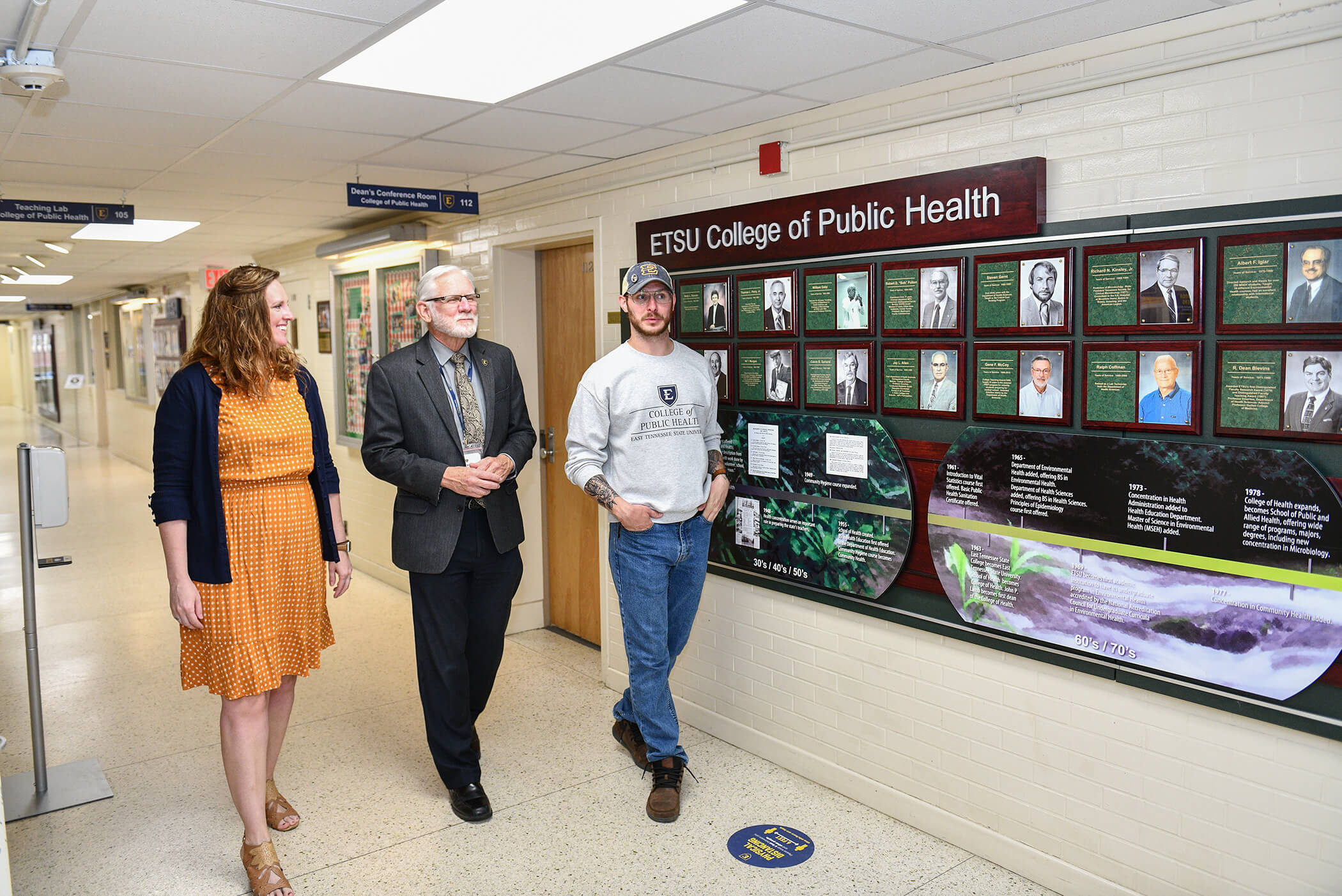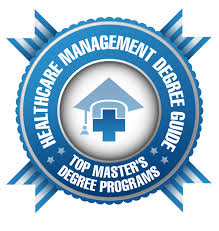Public Health
Make an Impact
The Master of Public Health (MPH) allows students to pursue many different goals in the healthcare industry. With concentrations in biostatistics, epidemiology, community health, or leadership and policy studies, graduates leave the program prepared to examine complex public health challenges and develop practical solutions. Additionally, research opportunities allow students to gain valuable lab experience. Students looking for more hands-on experiences can benefit from internships.
This degree program was designed with working professionals in mind, offering the flexibility and convenience of online coursework led by the same faculty teaching on campus. Balance academic excellence with real-world applications and get the knowledge and skills needed to make a meaningful impact on health and well-being.

Specialize Your Skills
The U.S. health system is the largest industry in the nation, and the many fields of public health are experiencing rapid employment growth. Visit the MPH website to explore careers in Public Health.
All graduate programs in the College of Public Health are nationally accredited by the Council on Education for Public Health (CEPH). The specializations below offer the option to begin in the fall or spring term. Additionally, all programs have removed the requirement for GRE scores!
Program Concentrations
-
Biostatistics
Biostatistics is a quantitative field where students learn to collect, manage, and analyze public health data. Coursework provides instruction in basic analytical methods and the use of statistical software. This MPH degree program from ETSU was designed with working professionals in mind, offering the flexibility and convenience of online coursework led by the same faculty teaching on our campus.
Program
Biostatisticians with advanced degrees can find positions in government, industry, and academia. The need for biostatisticians is mentioned in Objectives for the Nation and the Seventh Report to the President and Congress on the Status of Health Personnel in the United States.
Students enrolled in this concentration will learn basic analytical methods and the use of statistical software. Biostatistics professionals are vital in analyzing data so that public health prevention and control methods can be used to prevent disease and promote health. A strong aptitude and skills in mathematics are needed.
Program information including curriculum and graduation requirements can be found in the ETSU Graduate Catalog.
-
Community Health
Establishing collaborative organizational and community partnerships is extremely important in public health. Community Health prepares students to interact with communities for health education and promotion. Students also learn how to develop and conduct health assessments and program evaluations.
Program
The online MPH - Community Health program offers competency-based preparation for public health practice in population-focused health education and health promotion. It prepares practitioners who can develop, implement, and evaluate community-based interventions to create collaborative organizational and community partnerships.
Program information including curriculum and graduation requirements can be found in the ETSU Graduate Catalog.
-
Environmental & Occupational Health
Environmental and Occupational Health focuses on understanding and mitigating the impact of environmental and workplace factors on human health. Professionals work to ensure safe and healthy environments by studying how these factors interact with biological and social determinants of health. Students gain proficiency in assessing community environmental health needs through data collection, analysis, and reporting. They also develop strategies to prevent disease and injury, promote sustainable practices, and protect communities from environmental risks.
Program
The online MPH - Environmental and Occupational Health program helps students develop expertise in investigating, monitoring, and addressing environmental issues that impact public health. Environmental and Occupational Health trains professionals to understand the complex relationships between environmental factors, as well as social and organizational influences within communities.
Program information including curriculum and graduation requirements can be found in the ETSU Graduate Catalog.
-
Epidemiology
Epidemiology is the "basic science of public health," and as such epidemiologists are health professionals who study disease, illness, and injuries. They attempt to determine who becomes ill; why certain people are more likely to become ill: and how to prevent the spread of illness. Additionally, they seek to reduce the risk and occurrence of negative health outcomes through research, community education, and health policy.
Program
The MPH - Epidemiology program is designed to provide students with an understanding of the concepts of epidemiology used in public health practice.
Program information including curriculum and graduation requirements can be found in the ETSU Graduate Catalog.
-
Public Health Leadership & Policy
Leadership & Policy prepares graduates to effectively lead a public health organization using their budgeting, finance, strategic planning, and policy design, implementation, and analysis skills. This concentration is ideal for students interested in public health, health policy, and health disparities research to prepare for careers in the workforce as well as for advanced terminal degrees (e.g., Dr. PH, Ph.D, JD).
Program
The MPH - Public Health Leadership & Policy degree prepares graduates for leadership roles in public health and health policy through an applied curriculum focused on practice and interprofessional experiences.
Program information including curriculum and graduation requirements can be found in the ETSU Graduate Catalog.
Students interested in an on-ground and in-person learning experience can read more on the MPH Department website.

Image credit: ETSU College of Public Health
Steps to Apply
-
1. Choose Your Program
The College of Public Health offers a number of master level programs that can be completed online or in the classroom. You can also chose to start the program in either the Fall or Spring terms.
Here are the Public Health programs you can choose from:
- MPH - Biostatistics
- MPH - Community Health
- MPH - Environmental and Occupational Health
- MPH - Epidemiology
- MHA - Health Administration
-
2. Create Your SOPHAS Application
The application process to SOPHAS is quite lengthy, so we encourage you to apply early!
This page has helpful information on what you'll need to assemble your application.
-
3. Submit Your SOPHAS Application
Applicants are encouraged to submit their SOPHAS applications as soon as they have entered their course work, Resume/ CV, and personal statement. Transcripts, letters of recommendation, GRE scores, and TOEFL scores (if applicable) should be designated for your SOPHAS application, and will be automatically attached to your application when received. -
4. Application is Received by the College of Public Health
They will monitor your submitted application and request any additional materials necessary to complete our evaluation. They begin reviewing your application only after it becomes “Verified” by SOPHAS and includes all necessary materials. You will then receive a confirmation email indicating your application has been forwarded to the review committee. Please monitor your application status often. -
5. Your Application is Reviewed
Each Department has created a specialized review committee to evaluate applicants on their individual strengths. Recommendations for admission are made based on the applicants with the greatest chance of success in the programs. If you have any questions about the strength of your application, we encourage you to contact the department representative. -
*Notes and Additional Information*
While the college has a priority and a final deadline, all applicants are encouraged to apply before the priority deadline.
Applications made to SOPHAS can take up to four (4) weeks to be processed and released to the college. Average SOPHAS processing time is two (2) weeks.
If recommended for admission by the Department, you will receive instructions to complete the Graduate School supplemental application. There are separate deadlines for each application. Both must be completed, including all supporting documents, by the published deadline.
Cost
Credits to complete this program: 43-46 credit hours
| TN Residents | eRate (Out of State, 100% online) | Out of State |
|---|---|---|
| $646 per credit hour | $805.50 per credit hour | $1,487 per credit hour |
| - Additional fees may be required. - Visit the Paying for College page to read more about costs and financial aid options. - The costs associated with attending ETSU can include both direct and indirect costs. Please review ETSU's Cost of Attendance for more details. |
||
Frequently Asked Questions
-
What accreditations apply to this program?
This program is accredited by the Council on Education for Public Health (CEPH).
-
Does a student's undergraduate degree have to be related to this field? What are the prerequisites?
No, students who do not have a CEPH-accredited undergraduate degree will take a course to provide the required foundational competencies of public health practice.
-
Are the courses for this program asynchronous or synchronous?
The internship is the only in-person requirement for the online program. All coursework for the online program is delivered asynchronously for maximum flexibility. However, on-campus courses are available for students seeking an in-person experience. There is also an optional on-campus orientation for new students.
-
Are there any on-campus requirements?
The internship is the only in-person requirement for the online program. All coursework for the online program is delivered asynchronously for maximum flexibility. However, on-campus courses are available for students seeking an in-person experience. There is also an optional on-campus orientation for new students.
-
Does this program require a dissertation, fieldwork or internship?
The MPH requires an internship. There is no requirement for a thesis or dissertation.
-
Is this program designed to meet the needs of adults who work full-time and/or have family obligations?
Absolutely! The flexibility of the program allows students to adjust their course schedule to meet their needs. Students can take one or two courses per term, or even skip a term depending on their other obligations. We strongly encourage you to stay in contact with the MPH program coordinator throughout the program.
-
What is the time to completion?
Full-time students will typically complete this program in 2 years.
Completion timelines for part-time students vary depending on their preferences and number of courses taken each academic term. Most part-time students enrolled in this program finish in 3-4 years. Students must complete the program within the six-year matriculation limit (starting from their date of first enrollment).
-
Is there a plan of study/course schedule available for review?
An overview of the curriculum is provided in the ETSU Graduate Catalog (see links for each concentration above). The full-time programs of study are outlined on the MPH website. Part-time programs of study are individualized based on student preferences and course availability.
-
Are scholarships available?
Please visit the College of Public Health website. The department is also a Coverdell Fellowship partner.
Students are also encouraged to visit the Paying for Graduate School website for information regarding ETSU graduate scholarships and other financial resources.

